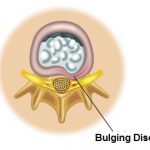Spinex Team
Will my disc herniation go away on it’s own?
The common analogy for a disc herniation (sometimes called a disc bulge) is jam oozing out of a doughnut, and if you are unlucky the jam presses on a nerve ending in pain where-ever that nerve supplies, often the leg in lower back disc herniations.
Continuing the doughnut analogy, a common question that we get asked at our specialist disc herniation clinic is “so will my disc herniation go away on it’s own?” Current research shows that your immune system will try to clean up the ‘jam’ that has extruded from the disc/doughnut. In-fact, the healing response is partly responsible for the pain that you may experience, particularly in the early stages of the condition. This is because the natural inflammatory response will often exaggerate the pressure on the nerve and surrounding tissues. This is often why anti-inflammatory medication can help with the pain, but also becomes less effective as time goes on, because the inflammatory response is less pronounced after a few weeks.
There are many things that you can do to help speed up this process and also to make the healing process more complete.
Stop Smoking – Smoking has been clearly shown to reduce the rate and extent of disc material reabsorption.
Get Help – Osteopaths and Chiropractors have been shown to provide successful and cost effective treatment programmes for most people with disc herniations. Sports Nutrition Angel Magasin de fitness et de musculation pour la nutrition sportive buy est il vrai que faire du cardio sur un estomac ceci et cela sur la musculation. You will be examined fully and a treatment plan outlined for you. Furthermore, if your condition needs a surgical referral your practitioner may be able to organise this, or assure you of the right treatment options. It is best to choose a practitioner who specialises in vertebral disc herniations/disc bulges.
Nutrition – Make sure you drink plenty of water as your spinal discs are made predominantly of water. Secondly take a dose of naturally occurring vitamin C to give your immune system a boost. Lastly, just eating a healthy balanced diet with lots of fresh fruits and vegetables and good quality protein should be adequate for your body’s healing needs.

Only consider surgery as a last resort! Current studies show that you should only consider surgery if:
- You have progressive weakening of the muscles in the area of the nerve irritation (usually leg for lower back disc herniations & the arm for disc herniations in your neck)
- Your ability to urinate (pee) & defecate (poo) becomes impaired by the nerve compression caused by the disc herniation.
- Plus your pain levels are not manageable with conservative treatment and you cannot carry out your normal activities of daily living.

Spinex Disc Clinic is London’s specialist disc treatment centre. Located just off Edgware Road, Spinex provides non-invasive solutions using IDD Therapy disc treatment in combination with Vi Move movement sensor technology. If you are looking for non surgical treatment for a spinal disc issue such as a herniated disc or sciatica call Spinex for a FREE initial consultation on:
020 7100 4598.
References
•https://fixyourownback.com/public/articles/will-my-disc-herniation-ever-heal
•Henmi T, Sairyo K, Nakano S, Kanematsu Y, Kajikawa T, Katoh S, Goel VK. Natural history of extruded lumbar intervertebral disc herniation. J Med Invest. 2002 Feb;49(1-2):40-3.
•Komori H, Shinomiya K, Nakai O, Yamaura I, Takeda S, Furuya K : The natural history of herniated nucleus pulposus with radiculopathy. Spine 21 : 225 – 229, 1996.
•ItoT,YamadaM,IkutaF,etal.Histologic evidence of absorption of sequestration-type herniated disc. Spine 1996;21:230–4.
•Saal JA. Natural history and nonoperative treatment of lumbar disc herniation.Spine (Phila Pa 1976). 1996 Dec 15;21(24 Suppl):2S-9S.
•Fagerlund MK, Thelander U, Friberg S. Size of lumbar disc hernias measured using computed tomography and related to sciatic symptoms. Acta Radiol 1990;31(6):555–8.
•Maigne JY, Rime B, Deligne B. Computed tomographic follow-up study of forty-eight cases of nonoperatively treated lumbar intervertebral disc herniation. Spine (Phila Pa 1976) 1992;17(9):1071–4.
•Bush K, Cowan N, Katz DE, et al. The natural history of sciatica associated with disc pathology. A prospective study with clinical and independent radiologic follow-up. Spine (Phila Pa 1976) 1992; 17(10):1205–12.
•Jensen TS, Albert HB, Soerensen JS, et al. Natural course of disc morphology in patients with sciatica: an MRI study using a standardized qualitative classification system. Spine (Phila Pa 1976) 2006;31(14): 1605–12 [discussion: 1613].
•Autio RA, Karppinen J, Niinimaki J, et al. Determinants of spontaneous resorption of intervertebral disc herniations. Spine (Phila Pa 1976) 2006; 31(11):1247–52.
•Monument MJ, Salo PT. Spontaneous regression of a lumbar disk herniation. CMAJ 2011;183(7):823.
•Liu JT, Li XF, Yu PF, Li XC, Qian Q, Liu GH, Yu ZH, Ma QH, Tang DZ, Jiang H.Spontaneous resorption of a large lumbar disc herniation within 4 months. PainPhysician. 2014 Nov-Dec;17(6):E803-6.
Categories
- Show All
- anxiety
- arthritis
- back pain
- chiropractic
- chiropractor
- Chiropractor Near Me
- chronic pain
- desk work
- Disc Bulge
- disc bulges
- disc herniation
- IDD Therapy
- nutrition
- orthotics
- osteopath
- osteopath London
- pillow
- pregnancy
- research
- sciatica
- Shoulder Pain
- Spinal Arthritis Treatment
- Spinal Degeneration
- Spinal Stenosis
- spinal stenosis treatment
- spinex
- sports injury
- stress
- Uncategorised
- Uncategorized
- ViMove
- work







